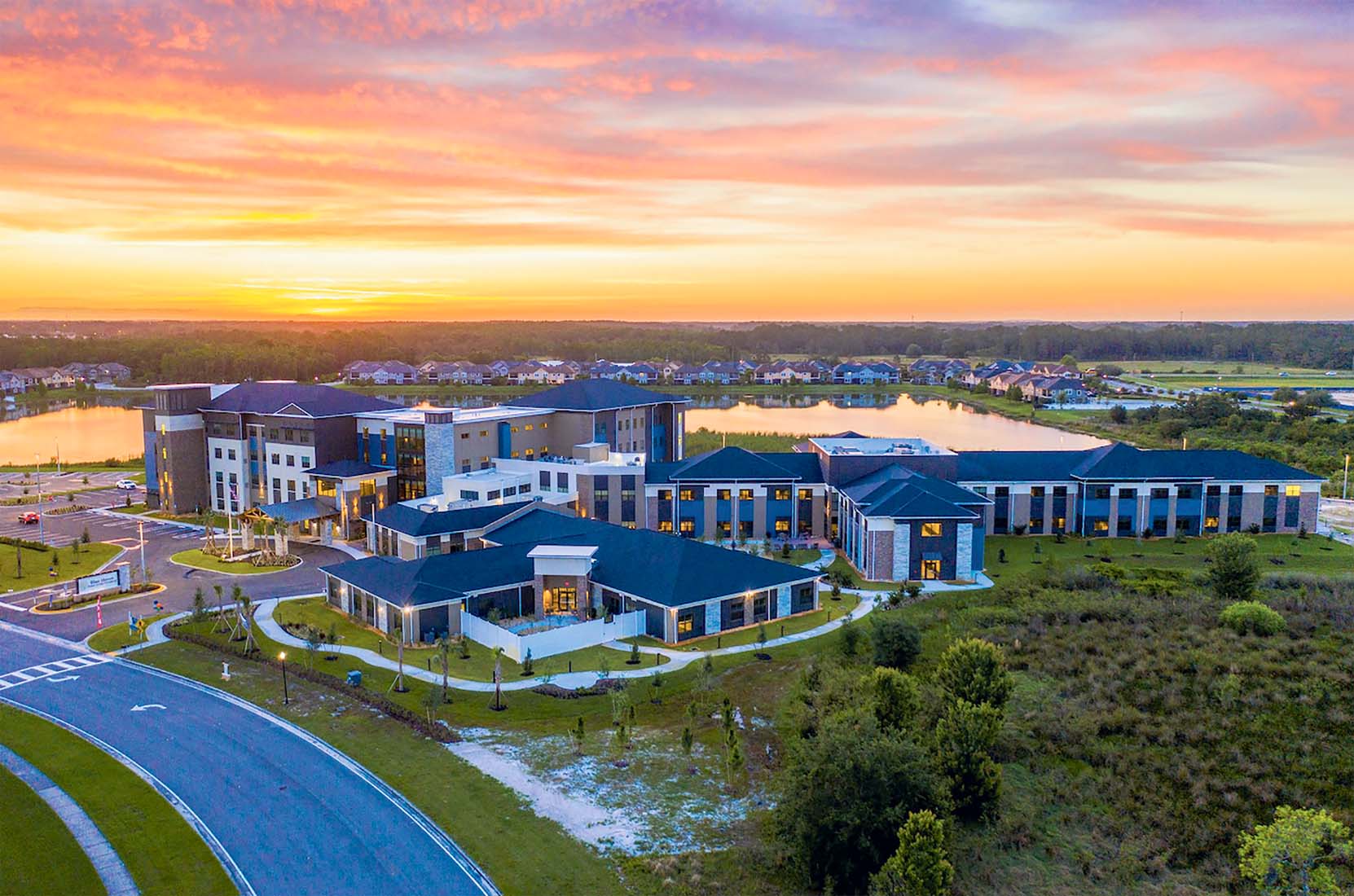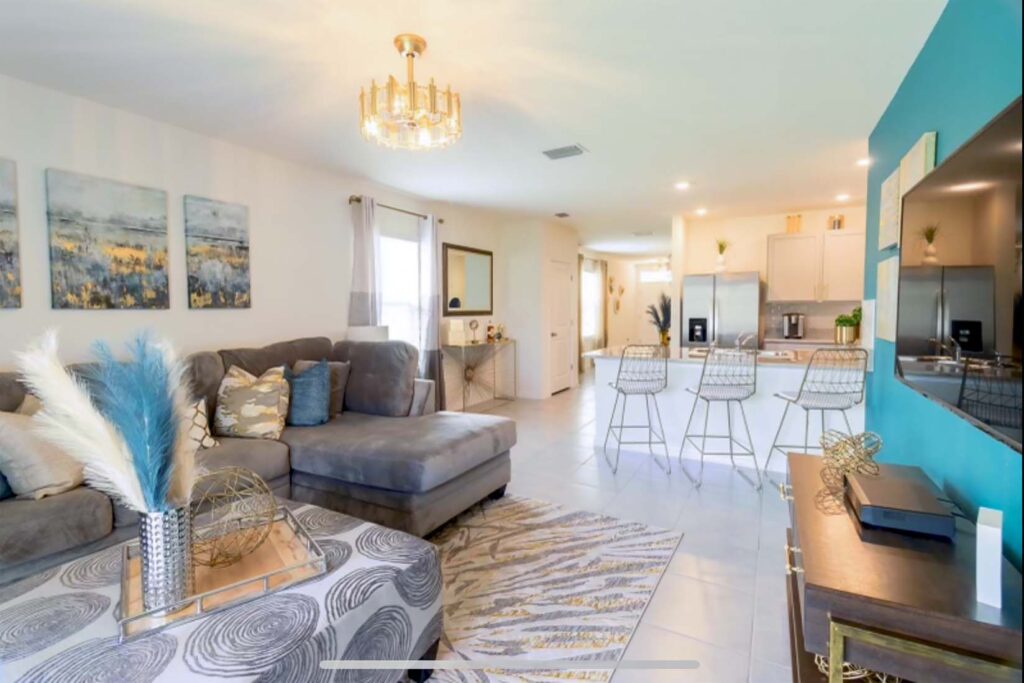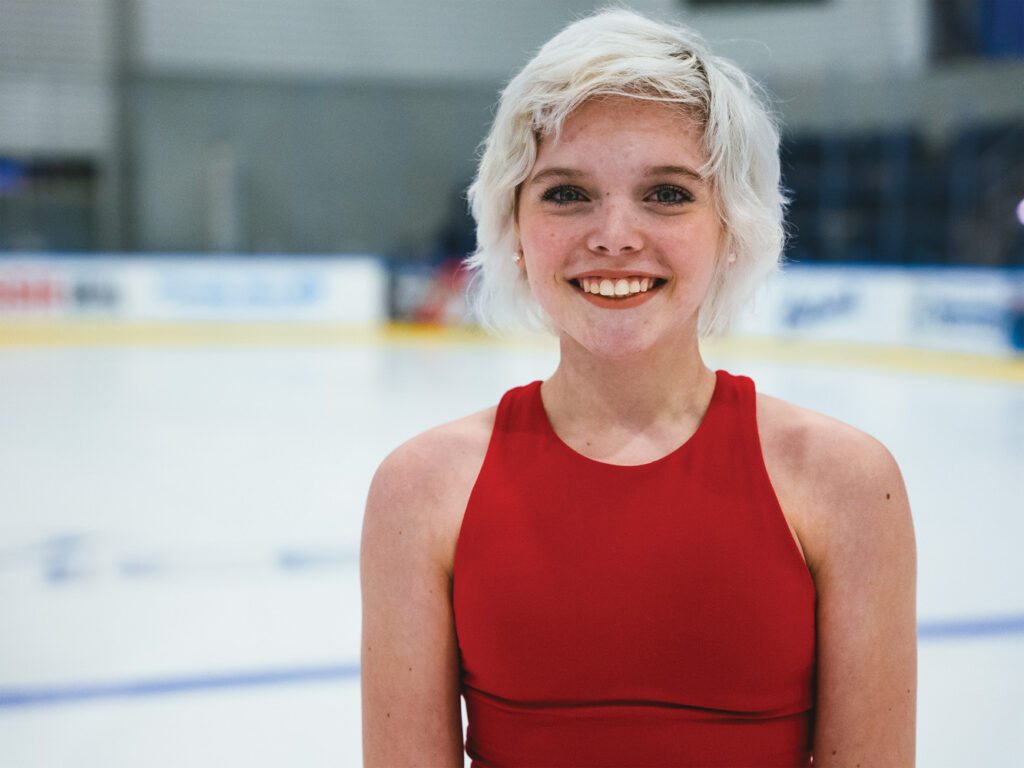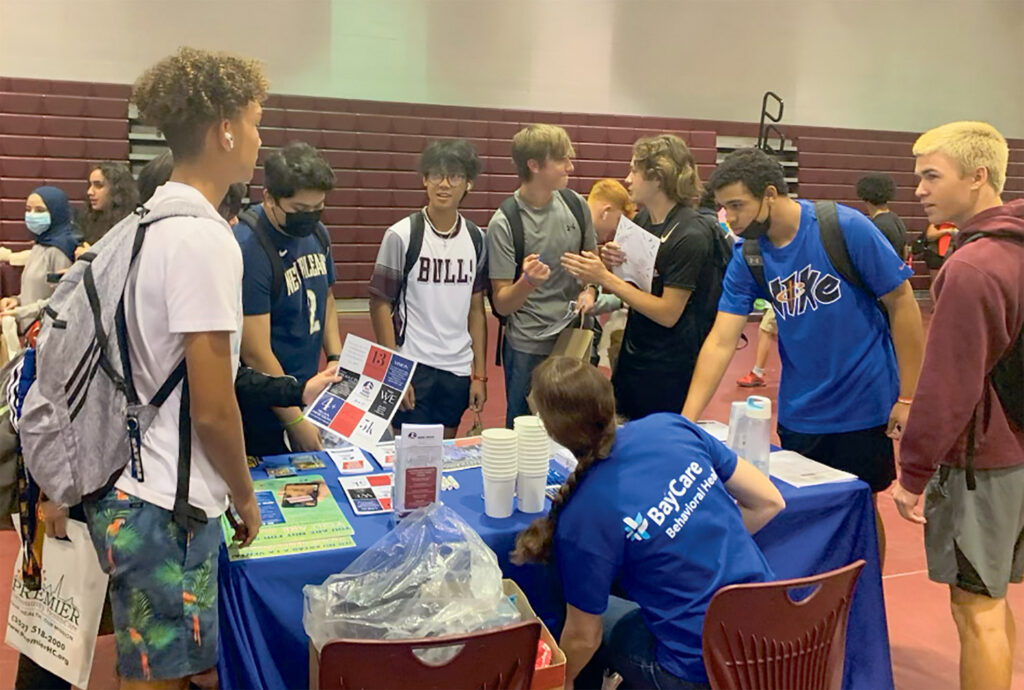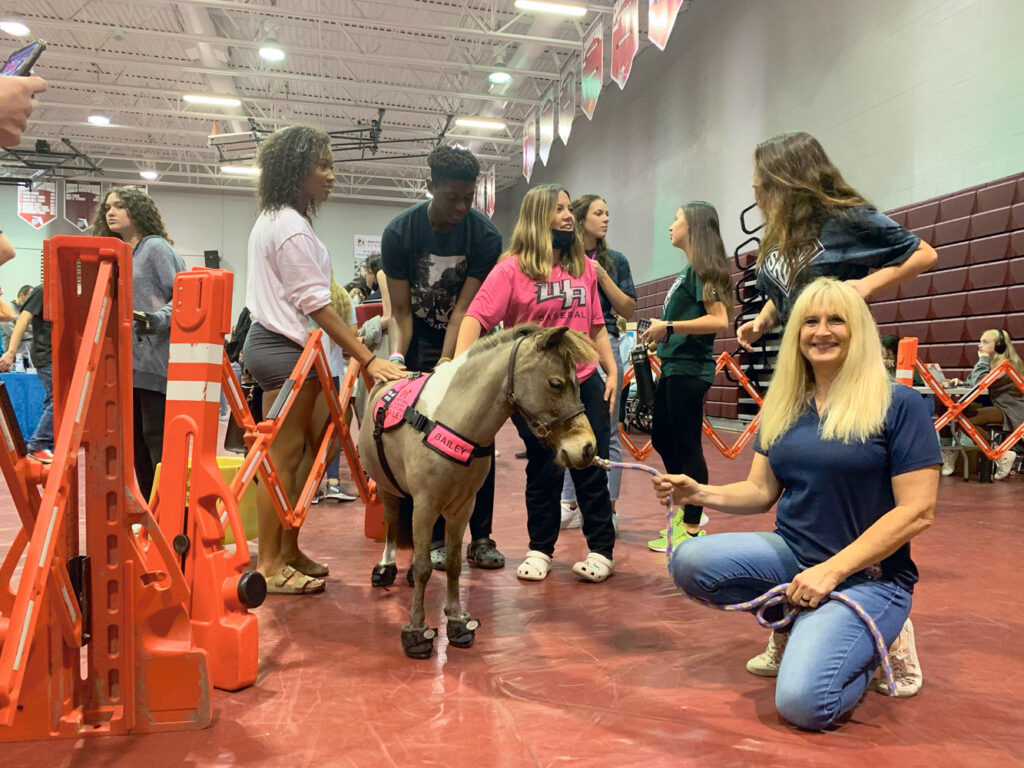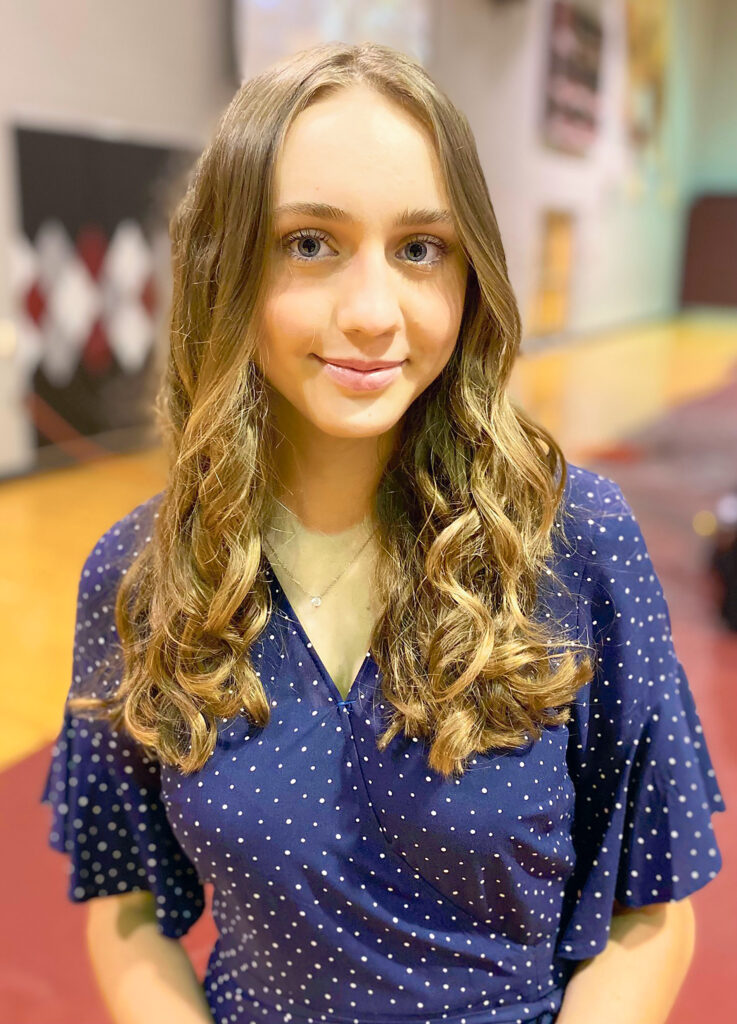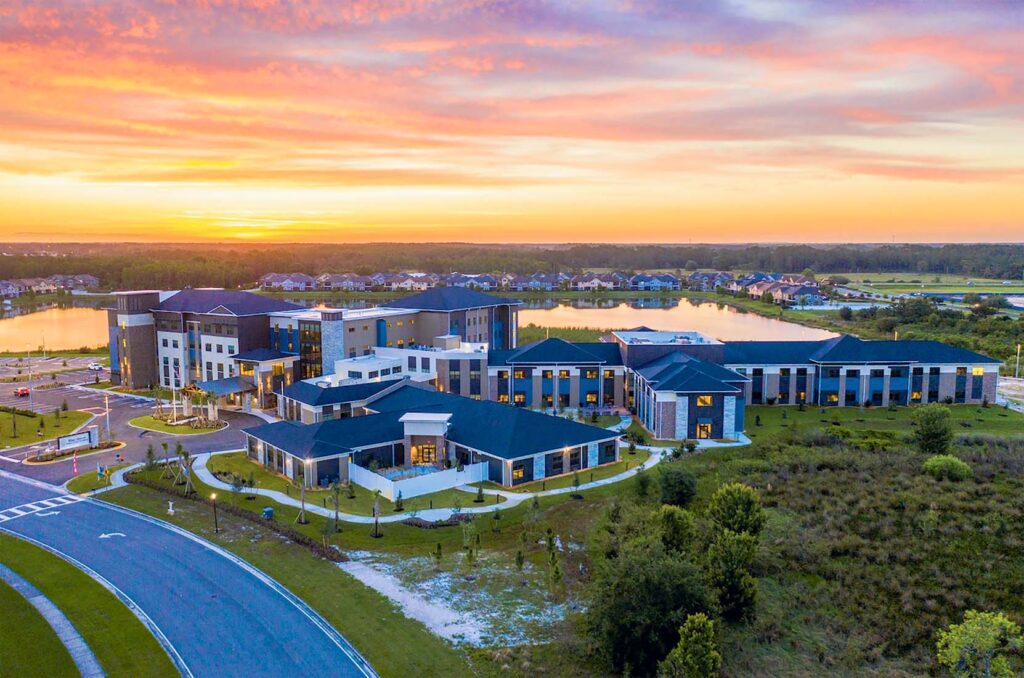
Candy Spitzer searched extensively for the perfect retirement home. Her criteria included a place near her children, where she didn’t have to cook or clean and where she could still have neighbors. She found the community she was looking for at Blue Heron Senior Living & Memory Care.
“I wanted to be with people who would be similar to my age so that we could still talk to and really communicate with each other,” says Spitzer, a 78-year-old Blue Heron resident. “Blue Heron was so far above any of the other places that I went because I never saw that ability for us to be able to get together as much as we can here.”
Blue Heron Senior Living, located on Eagleston Blvd. off Bruce B. Downs Blvd. in Seven Oaks near the new (opening in 2023) BayCare Hospital, had a staggered opening in June 2021. The 159,000-sq.-ft. retirement home offers four distinct lifestyle communities for residents — including assisted living, memory care, skilled nursing and rehabilitation.
“We are a very unique community,” says Community Relations Director Lilly Gonzalez. “We are the only community in the Wesley Chapel and New Tampa area that combines assisted living, memory care, skilled rehab and long-term care, all on one campus.”
Even beyond Wesley Chapel/New Tampa, the combination of all four services is rare.
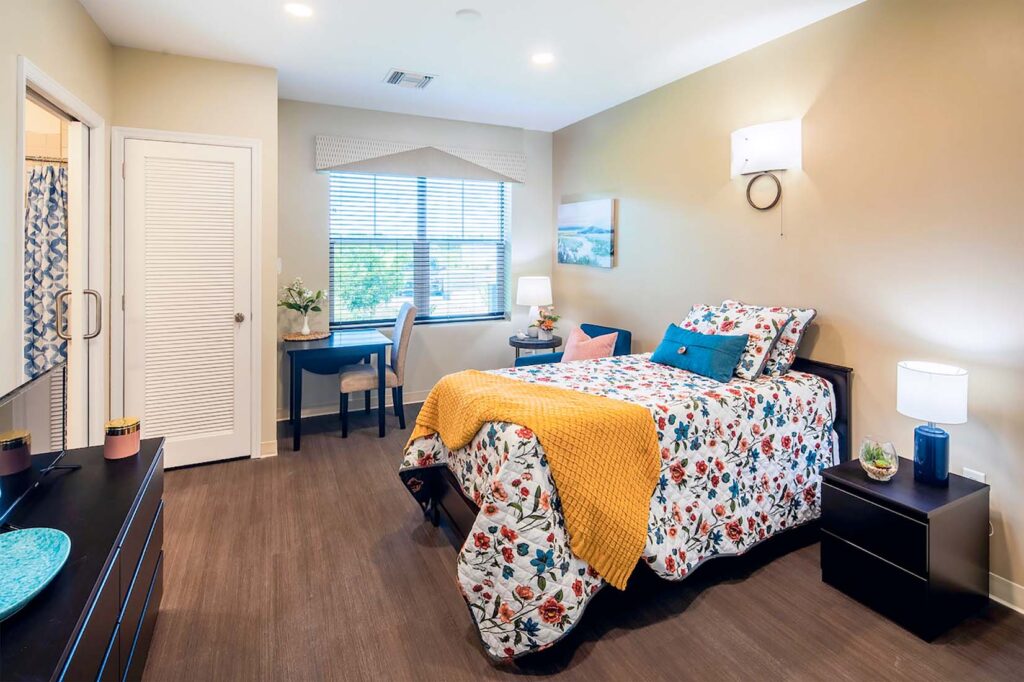
Gonzalez says the goal of Blue Heron is to provide care and services to its residents, so they can have the independence to do the things they enjoy. Family members, she says, can visit and spend quality time with their loved ones knowing they are being cared for properly.
“When their family comes, they can enjoy the visit without having the burden of having to care for [and ask], ‘Did you take your pills, did you take a shower, did you drink your water?,’” Gonzalez says. “They can rest assured that we took care of those responsibilities.”
An Array of Choices
Spitzer is just one of about 83 residents who currently live in the assisted living community. There are 18 studio apartments, 43 one-bedroom apartments and 12 two-bedroom apartments to choose from. Residents of the 73 apartments — some are occupied by couples —can partake in social, educational, spiritual and health-oriented activities.
Residents also are welcome to leave their homes to shop or go out to eat, Gonzalez says, which is something Blue Heron residents like to do often. Residents also receive a pendant, often worn like a necklace, that they can press in case they need a care team member for assistance.
Blue Heron offers a host of amenities. In each assisted living apartment, there are full-sized refrigerators, a washer and dryer, television and telephone service, as well as WiFi, which along with the other utilities, are all included in the monthly price. The lobby has comfortable seating and a gas-fired fireplace, ideal for small gatherings or just relaxing.
The main dining area, which serves up to three meals a day to residents, is behind the lobby, and also has an open kitchen area, called The Bistro, for grab-and-go snacks and drinks, including coffee and a wine tap for residents to enjoy while watching television or mingling with new friends
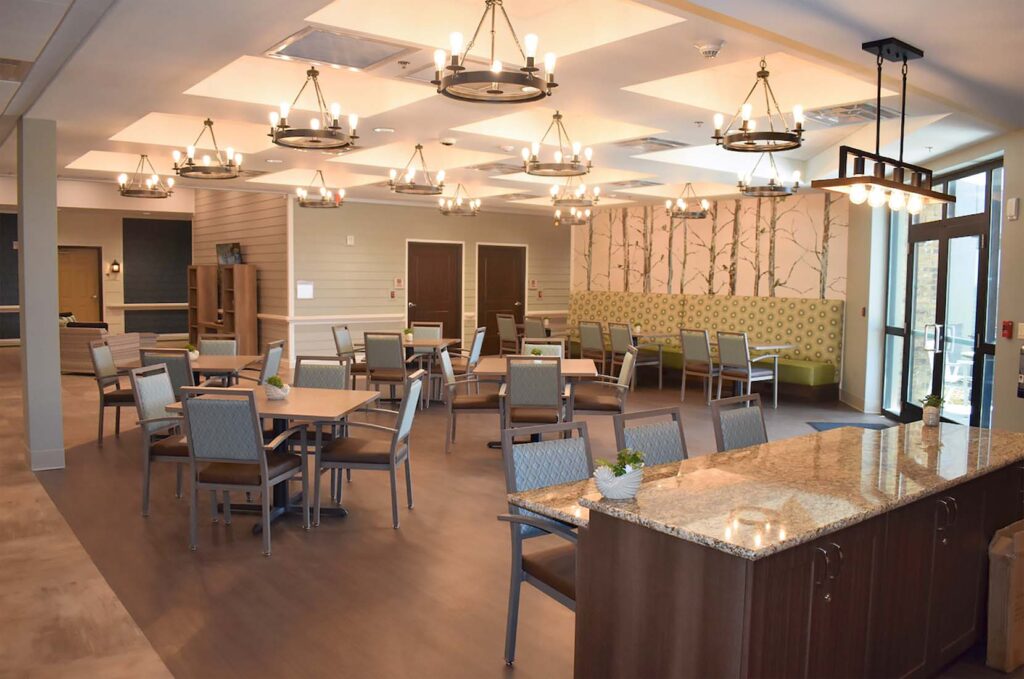
When the weather is right, an outdoor patio beckons. It features a gas grill, a putting green and plenty of umbrella-covered seating for those who choose to look out over a sizable pond. It also is a perfect area for live music, which residents are treated to on occasion.
Blue Heron also has an art studio/gallery, a spa/salon and a life enrichment center.
Gonzalez says the fourth floor might be the residents’ favorite — “It has a lounge area and it’s really a pretty place to watch the sunsets,” she says.
Some apartments have balconies that overlook a courtyard and the pond as well, offering beautiful views.
To provide peace of mind, Covid-19 regulations are in place at all Blue Heron communities. Employees are regularly tested for Covid-19 and residents are required to wear masks in the common areas.
This has not, however, done away with the community aspect of Blue Heron, Gonzalez says.
She recalls a time when residents did not want anyone to be excluded, so they pushed two tables together in the dining room. Gonzalez says the residents take pride in the community and make it comfortable and inclusive for everyone, which is something management also encourages.
“It’s really a precious thing,” she says. “They’re able to feel comfortable enough to display this and engage other new residents and make them feel comfortable — that’s unique.”
For Blue Heron residents with dementia, the community offers a secured, but intimate memory care community, which allows residents to thrive and not be overwhelmed. Offering a smaller home-like environment also ensures the personalized attention and programming these residents deserve.
Gonzalez says that with Memory Care, “it’s all about engagement with planned events, scheduled outings, meaningful and purposeful programs that keep our residents stimulated, within their own familiar environment.”
She adds that the Memory Care community provides a supervised neighborhood for residents, while also allowing them to maintain their independence.
“For those who may have a tendency to try to walk away and go look for a loved one or go look for their home and wander off, well then, the independent area in assisted living is no longer safe for them,” she says. “Memory Care is a secured neighborhood and provides that safety and peace of mind.”
While the 22 Memory Care studio apartments may all be similar, the front of the “cottages” vary, with some designed with brick, stone or wood.
Skilled Nursing & Rehab
“Skilled nursing and rehabilitation services are for patients who need more acute services for varying surgeries, injuries or illnesses,” says Lenee’ Cedeno, the Director of Admissions for the skilled nursing side.
It is the only assisted living community in Wesley Chapel or New Tampa that offers both short-term rehabilitation services and long-term nursing care on-site. There are 106 private suites in the health and rehabilitation center, as well as a “Return to Home” program that includes advanced therapy equipment, physical, occupational and speech therapies, virtual reality workouts and neighborhood amenities.
“Our whole vision is for rehab to home,” Cedeno says. “To get patients stronger so that they can return home or to assisted living.”
Assisted Living or Memory Care residents who have a medical need that requires a skilled nurse or intense rehab can just transition over and get the help they need before returning to their regular apartments.
Assisted Living and Memory Care are independently licensed with the state of Florida, and the skilled nursing has a distinct license for their service specialty, Gonzalez says. Both areas of the community offer skilled, certified and licensed staff members through Resident Aides, Medication Technicians, Certified Nursing Assistants, Licensed Practical Nurses and Registered Nurses. A variety of doctors visit residents and patients, including cardiology, podiatry, psychology and many other specialties. Residents in Assisted Living can maintain their current primary care physicians if they choose to do so.
Another unique touch offered by Blue Heron is its respite stay program. If a family caregiver needs to go out of town for a few weeks and can’t leave a parent or older relative alone to care for themselves, they can stay at Blue Heron like they would a hotel, provided they meet the same requirements as a regular resident. These respite stays won’t be available forever because, eventually, Gonzalez says, Blue Heron will be at 100-percent occupancy. But until then, “it is a service to the community.”
Those same caregivers also can benefit from a free support group offered by Blue Heron on the third Wednesday of every month, from 3 p.m.-4:30 p.m.
Eileen Poiley from the Byrd Alzheimer’s Center & Research Institute at USF hosts the free monthly forums. The forum are designed to help Tampa-area caregivers cope with any stress and guilt, deal with loved ones who may no longer recognize them, are caring for a relative who is exit-seeking or are in physical and cognitive decline. Gonzalez says roughly a dozen or so caregivers attend, and everyone is welcome.
The long list of amenities and the growth of the community are two of the main reasons why Spitzer is overjoyed with her choice. For people wondering about living at Blue Heron, she says it is the best senior living community she’s looked at in the area.
“I just wish more people would understand that it’s not a punishment for their children to take them like my sons brought me,” Spitzer says. “It’s become a joy and I would hope that older people will begin to look at this as being their new home and that you can live a very nice life.”
Blue Heron Senior Living is located at 5071 Eagleston Blvd. in Wesley Chapel, and its hours are Monday-Friday, 8 a.m.-8 p.m., and 9 a.m.-5 p.m. on the weekends. For more information, call (813) 454-0513 or visit SeniorLivingAtBlueHeron.com.

